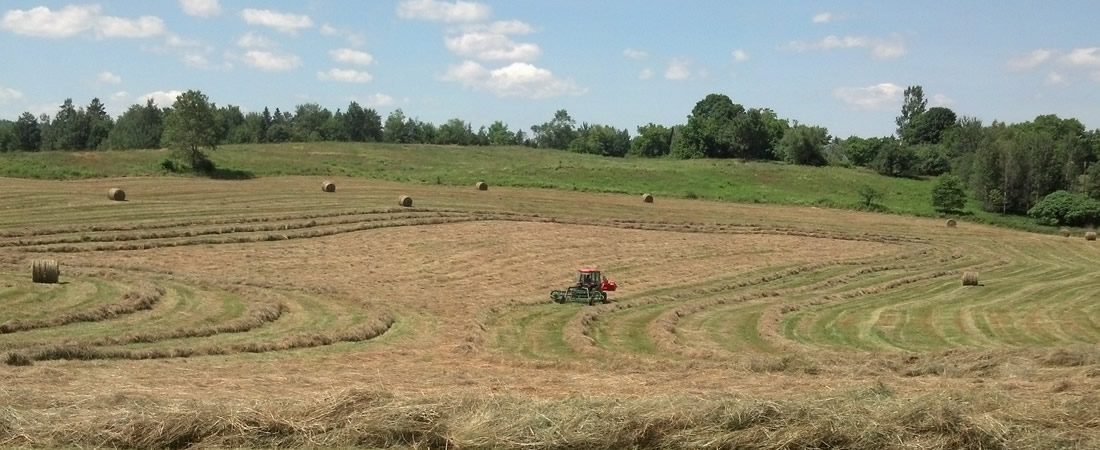Nutritional Needs

With a 4-chambered stomach, sheep like all other ruminants, have the ability to convert forages into energy for growth and production. What you feed your sheep should reflect what stage of production they are in. A lactating ewe that is nursing triplets has an entirely different set of nutritional demands than does a ewe that has weaned her lambs 6 weeks earlier. Late gestation and lactation present the highest demands on a ewe especially if she is carrying/nursing multiple lambs. For the rest of the year, a good ewe, especially a Katahdin ewe, needs little more than average quality pasture.
Forages
In our opinion, it all starts with your forage base. In the northeast, we typically feed a significant amount of stored forage (hay and silage) in the winter months when the pastures are deep with snow and ice. Understanding the quality of that forage should determine whether or not you’ll need to supplement with additional feeds like grains. If you have a small flock and you buy your hay, it often comes from the same cutting, perhaps even from the same field. Conducting a nutritional analysis of the hay can be quite informative and may save money in the long run. We have had success over two years feeding baleage (i.e., wrapped & ensiled grass hay). However, we have noticed a tremendous difference in fermentation and quality even from bale to bale, but when it is made correctly, sheep will devour it.
Grains and Concentrates
Do sheep need grain?? Well that depends, mostly on what their nutritional requirements are at that point in time and what other feeds they have available. It’s not advisable to feed strictly grain to sheep. A certain amount of roughage helps keep their gut functioning properly requiring that they actively ruminate to break it down. The biggest need for grain is often in not meeting their protein requirement. Fresh green forages, typically grasses and legumes, have adequate protein levels so supplementing protein to sheep on pasture is considered unnecessary. A shortage of protein in their diet is most common when feeding late harvested, first crop hay when confined like in winter. Good supplemental sources of protein include:
- Soybean meal
- Field Peas
- Cull Beans
- Canola
Energy may actually be in short supply when sheep are grazing succulent spring pastures. Supplementing with good quality hay will help. Finishing lambs, also requires relatively high levels of energy and many farmers will supplement the diet of their sheep to boost energy intake. Good supplemental sources of energy include:
- Whole or flaked Corn
- Molasses
- Beet Pulp
Minerals
Sheep should be provided a source of minerals free choice 24/7/365. Sometimes that’s easier said than done. Sheep are well known to crave minerals irregularly throughout the year. The simplest solution to preventing mineral deficiencies is to purchase a prepared mineral from a feed store. A prepared mineral will have a balanced amount of selenium which is important for growth of the fetus and vigor of newborn lambs. We have used other natural mineral sources (SEA-90) successfully for many years as well. SEA-90 is dehydrated, mineral-rich seawater from the Sea of Cortez. Similarly, Redmond Salt, a mined product, is sourced from remnants of a prehistoric inland sea in western North America. Availability in the northeast for either can be limited. Most sheep farms use loose (i.e., granular) minerals in tray or covered, spinning outdoor feeders. Salt blocks are generally not prepared for sheep and some farmers worry that those that are safe for sheep can cause unnecessary tooth wear.
Thoughts on Copper
Copper is an essential micronutrient for all animals. Very trace amounts are needed for nervous system function. It’s in the grass and clover on pasture, in their hay, and in their grain. Measured amounts are present in minerals as well. Most sheep breeds have a low tolerance for copper and can suffer toxicity especially if fed supplemental sources of copper. Copper has a complex relationship with another element, Molybdenum (and to a lesser extent Sulfur), that can affect copper availability. Compounding this concern is that copper is stored in the liver and not readily eliminated from the body. In times of stress, however, Copper can be mobilized and become lethal to individuals fed higher than recommended levels. Commercially prepared minerals for sheep as well as professionally-balanced pelletized grain and sweet feed rations have levels of copper that are safe for sheep. Feeding grain or minerals designed for cattle, goats or other species should be avoided.
